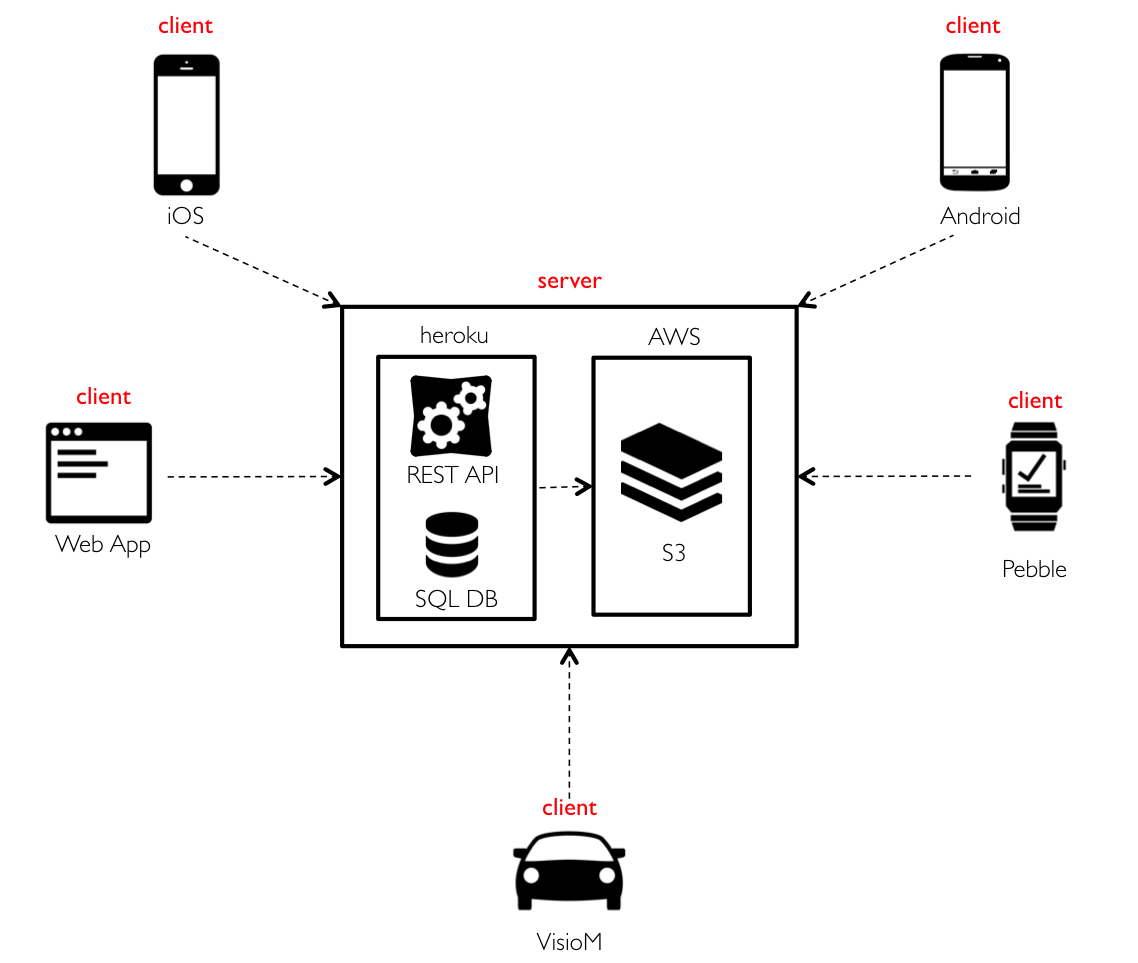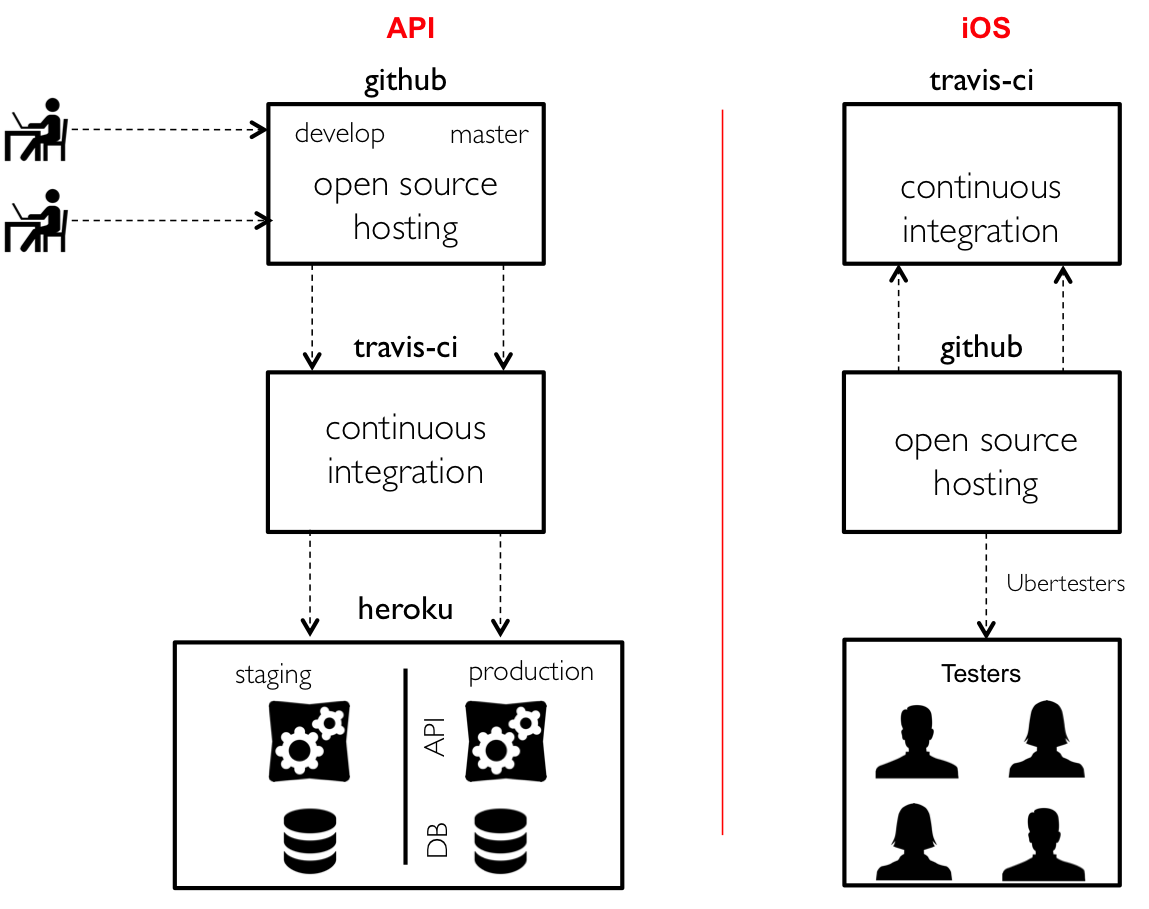TUMitfahrer Web App as well as REST API for mobile clients. Backend is written in Ruby on Rails and uses many additional technologies such as web sockets.
Domain model is shown on the class diagram below (click to zoom):

Elements being implemented:
- backend in Rails and REST API (Pawel)
- iOS app (Pawel)
- web app using Haml/jQuery (Anuradha, Shahid)
- Android app (Abhijith, Amr)
- Pebble app and VisioM intergration(Saqib, Behroz)
- Test framework (Dansen)
- UI and UX (Lukasz)
To use API, use for now http://tumitfahrer-staging.herokuapp.com/.
Each API call starts with /api/v2 and is followed by a specific verb, e.g. http://tumitfahrer-staging.herokuapp.com/api/v2/rides.
If it's not clear what should be e.g. format of parameters, check out how is the API implemented and try to reverse engineer it. The API functions are HERE. The output of API controllers is defined in serializers HERE.
Currenlty not all API requests require api_key in request header, however, soon it will be added on backend so it will be required to get a response.
TUMitfahrer has existing user base of over 1000 users. Their passwords are obviously encrypted and cannot be read. The idea is to create a authentication system that will enable old users as well as new ones to login in. Therefore the authentication mechanism is a bit complex.
To login to TUmitfahrer you need to create a POST request to sessions. In the header Authorization: Basic, you should provide encrypted credentials in the form: base64_encryption(username:sha512_encryption(password+'toj369sbz1f316sx')). sha512_encryption is a standard encryption algorithm whose implementation you can find on the Internet, and here it's used to encrypt password with added salt 'toj369sbz1f316sx' (the salt is taken from the old system). username:sha512_encryption are again encrypted with base64 encryption.
So to sum up, pass a header in form:
Authorization: Basic base64_encryption(username:sha512_encryption(password+'toj369sbz1f316sx'))
| Type | URI | Explanation |
|---|---|---|
| POST | /sessions |
create a new session for the user. Required header: email, hashed_password |
http://tumitfahrer-staging.herokuapp.com/api/v2/users
To create a new user, create a POST request to /users
| Type | URI | Explanation |
|---|---|---|
| GET | /users |
get all users. Response { "users": [ {"id": 1, ...} ] }. For full response see HERE |
| GET | /users/:user_id |
get a specific user. Required header: Authorization: Basic encrypted_email_and_password. For encrypted password and email, see above. Response: {"user": {"id": 1, ...} } |
| POST | /users |
create a new user, required parameters as json: {"user" : { "email" : "[email protected]", "first_name": "Name", "last_name": "Name", "department": department_id}} where departmentNo is a number of faculty (faculties are taken is alpabethic order from : http://www.tum.de/en/about-tum/faculties/, so e.g. Architecture has departmentNo 0) |
| PUT | /users/:user_id |
update a specific user. Required header: Authorization: Basic encrypted_email_and_password. For encrypted password and email, see above. Parameters that can be updated: phone_number: string, car : string, department : integer, hashed_password : string, password_confirmation : string, first_name : string, last_name : string. Password and password_confirmation are required parameters. |
http://tumitfahrer-staging.herokuapp.com/api/v2/rides
| Type | URI | Explanation |
|---|---|---|
| GET | /rides?page=0 |
get all rides by page. Response { "rides": [ {"id": 1, ...} ] }. For full response see HERE |
| GET | /rides/ids |
get ids of rides that exists in webservice. This method is called on a mobile client to check which rides should be deleted from the local database |
| GET | /rides/:ride_id |
get a specific ride. Response { "ride": [ {"id": 1, ...} ] }. |
| GET | /rides/:ride_id?from_date='2012-02-03 12:30'&ride_type=0 |
get all rides that were added or updated after from date. Response is a list of rides as in /rides controller. |
| GET | /users/:user_id/rides |
get all rides of specific user. Optional parameters: driver=true returns rides where user is driver. passenger=true returns rides where user passenger. past=true return all past rides of the user. |
| POST | /users/:ride_id/rides |
create a new ride for specific user. This user will become ride owner (it can be ride as driver or ride request). Required header: api_key: string, which is api key of this user. Ride params: "ride" : {"departure_place": string, "destination": string, "departure_time": date, "free_seats" : integer, "meeting_point" : string, "ride_type" : intger (0->campus, 1-> activity), "is_driving" : true, "car" : string, "departure_latitude" : double, "departure_longitude" : double, "destination_latitude": double, "destination_longitude":double } |
| PUT | /users/:user_id/rides/:ride_id |
Update a specific ride. Parameters : "ride" : {"departure_place": string, "destination": string, "departure_time": date, "free_seats" : integer, "meeting_point" : string, "ride_type" : integer (0->campus, 1-> activity), "car" : string, "departure_latitude" : double, "departure_longitude" : double, "destination_latitude": double, "destination_longitude":double } |
| PUT | /users/:user_id/rides/:id?removed_passenger=id |
Update a ride by removing a passenger with a given id. |
| PUT | /users/:user_id/rides/:id?added_passenger=id |
Update a ride by adding a passenger with a given id. |
| DELETE | /users/:user_id/rides/:ride_id |
delete a given ride. |
http://tumitfahrer-staging.herokuapp.com/api/v2/activities
| Type | URI | Explanation |
|---|---|---|
| GET | /activities |
get all activities of what happened in a system. Parameters: activity_id : integer, where activity id is id of returned activities object. For a sample response see: tumitfahrer |
| GET | /activities/badges |
get a number of new activities that happened after a specific time which is given in parameters. Parameters: campus_updated_at=date&activity_updated_at=date&timeline_updated_at=date&my_rides_updated_at=date&user_id:id. Sample response: {"badge_counter":{"id":0,"created_at":date,"timeline_badge":integer,"timeline_updated_at":date,"campus_badge":45,"campus_updated_at": date,"activity_badge":integer,"activity_updated_at":date,"my_rides_badge":integer,"my_rides_updated_at":date}} |
| Type | URI | Explanation |
|---|---|---|
| GET | /users/:user_id/devices |
get all devices of a specific user. Sample response: {"devices":[{"id":4,"user_id":75,"token":"abc","created_at":"2014-05-06T20:14:23.872+02:00","updated_at":"2014-05-06T20:14:23.872+02:00","enabled":true,"platform":"ios","language":null}],"status":"ok"} |
| POST | /users/:user_id/devices |
create a new device for specific user. Parameters should be of the form: { "device" : { "token" :string, "enabled" : boolean, "platform" :string }}. Platform is one of: android, ios, windows |
Each ride has a list of conversations between a driver and passenger. Each conversation consits of Messages.
| Type | URI | Explanation |
|---|---|---|
| GET | /rides/:ride_id/conversations |
get all conversations for a specific ride. No parameters. Response has a form: {"conversations":[{"id":integer,"user_id": integer,"other_user_id": integer,"ride": Ride, "messages":[{"id":68,"content": string,"is_seen":false,"sender_id": : integer,"receiver_id": integer,"created_at": date,"updated_at": date}]}]} |
| GET | /rides/:ride_id/conversations/:id |
get a specific message for conversation for a specific ride. Response is above with conversation instead of conversations. |
| Type | URI | Explanation |
|---|---|---|
| GET | /rides/:ride_id/conversations/:conversation_id/messages |
Create a message in a given conversation for a specific ride. Parameters: sender_id : integer, receiver_id : integer, content : string. Response is a status message: "message" : string (success or not), status : status_code. |
| Type | URI | Explanation |
|---|---|---|
| GET | /users/:user_id/ratings |
get all ratings (both given and received) of a specific user. Parameters: given: boolean. Given is true for getting given ratings, given is false for getting received ratings. Example response: {"ratings":[{"rating_type":1,"from_user_id":95,"to_user_id":75,"ride_id":481,"created_at":"2014-06-19T10:57:59.372+02:00","updated_at":"2014-06-19T10:57:59.372+02:00"}]} |
| POST | /users/:user_id/ratings |
create new rating from a specific user. Parameters: to_user_id : integer, ride_id : intger, rating_type : integer. Respose is newly created Rating. |
| Type | URI | Explanation |
|---|---|---|
| GET | /rides/:ride_id/requests/ |
Get all requests for a ride with given id. Response { "requests": [ {"id": integer, "passenger_id" : integer, "ride" : Ride, created_at : date, updated_at : date} ] }. |
| GET | /users/:user_id/requests/ |
Get all user's requests. Response with Request (see above). |
| POST | /rides/:ride_id/requests |
create a new ride request for a specific ride. Parameters: passenger_id : integer. Response: newly created Request |
| PUT | /rides/:ride_id/requests/:id |
handle ride request for a specific ride. Parameters: passenger_id : integer, confirmed : boolean |
| DELETE | /rides/:ride_id/requests/:id |
delete a ride requests for a given ride. |
| Type | URI | Explanation |
|---|---|---|
| POST | /search |
search for a ride. Parameters departure_place : string, departure_place_threshold : integer, destination : string, destination_threshold : integer, departure_time : date, ride_type :integer. Response is an array of Rides. |
| Type | URI | Explanation |
|---|---|---|
| POST | /forgot |
send a password reminder to a given user specifiec by email provided in parameters. Parameters email : string. Response is a status message: "message" : string (successfully sent to email or not), status : status_code. |
| Type | URI | Explanation |
|---|---|---|
| POST | /feedback |
create a feedback for us from user. Parameters user_id : integer, title : string, content : string. Response is a status message: "message" : string (whether successfully sent or not), status : status_code. |
- friend_requests
- friends
- payments
- contributions
- projects
- passnegers
In the architecture diagram I used following icon licensed under Creative Commons Attribution that should be attributed:
- Smart Phone by Emily Haasch from The Noun Project
- Code by buzzyrobot from The Noun Project
- Database by Stefan Parnarov from The Noun Project
- Application by Brian Gonzalez from The Noun Project
- User by Rémy Médard from The Noun Project


